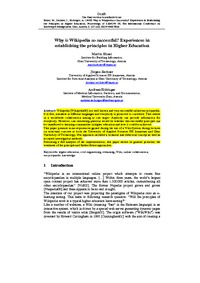Why is Wikipedia so successful?Experiences in establishing the principles in Higher Education
Publikationsdatum:
|
 |
 Diese Seite wurde seit 9 Jahren inhaltlich nicht mehr aktualisiert.
Unter Umständen ist sie nicht mehr aktuell.
Diese Seite wurde seit 9 Jahren inhaltlich nicht mehr aktualisiert.
Unter Umständen ist sie nicht mehr aktuell.
 Zusammenfassungen
Zusammenfassungen
 Die Autoren konstatieren ernüchtert, dass ihr BauWiki von den Studierenden passiv konsumiert, aber nicht aktiv erweitert wurde, trotz der Motivation, dass Ausdrucke des BauWikis an die Prüfung mitgenommen werden durften. Es gibt somit keine Garantie, dass sich das "Phänomen Wikipedia" in jedem Fall auf ein Wiki einer Lehrveranstaltung übertragen lässt.
Die Autoren konstatieren ernüchtert, dass ihr BauWiki von den Studierenden passiv konsumiert, aber nicht aktiv erweitert wurde, trotz der Motivation, dass Ausdrucke des BauWikis an die Prüfung mitgenommen werden durften. Es gibt somit keine Garantie, dass sich das "Phänomen Wikipedia" in jedem Fall auf ein Wiki einer Lehrveranstaltung übertragen lässt.
 Wikipedia [Wikipedia06] is a well known and very successful online-encyclopaedia.
It is free, available in different languages and everybody is permitted to contribute. This results
in a worldwide collaboration aiming at one target: Anybody can provide information for
everybody. However, one interesting question would be whether this successful principle can
be transferred to learning communities in higher education and how it could be achieved.
This paper presents some experiences gained during the use of a Wiki-System during lectures
on structural concrete at both the University of Applied Sciences FH Joanneum and Graz
University of Technology. Our approach included a technical and didactical concept as well as
accepted investigation methods.
Presenting a full analysis of the implementation, this paper shows its general potential, the
weakness of the principle and further future approaches.
Wikipedia [Wikipedia06] is a well known and very successful online-encyclopaedia.
It is free, available in different languages and everybody is permitted to contribute. This results
in a worldwide collaboration aiming at one target: Anybody can provide information for
everybody. However, one interesting question would be whether this successful principle can
be transferred to learning communities in higher education and how it could be achieved.
This paper presents some experiences gained during the use of a Wiki-System during lectures
on structural concrete at both the University of Applied Sciences FH Joanneum and Graz
University of Technology. Our approach included a technical and didactical concept as well as
accepted investigation methods.
Presenting a full analysis of the implementation, this paper shows its general potential, the
weakness of the principle and further future approaches. Dieser Text erwähnt ...
Dieser Text erwähnt ...
 Personen KB IB clear | Peter K. Antonitsch , Joseph Bergin , Anja Ebersbach , Markus Glaser , Peter Micheuz , Roland Mittermeir , David Turner , Jakob Voss , Chien-min Wang | |||||||||||||||||||||||||||||||||||||||||||||
 Begriffe KB IB clear | MediaWiki
, ÖsterreichAustria
,  TWiki
, Wikiwiki
, Wiki in educationWiki in education
, TWiki
, Wikiwiki
, Wiki in educationWiki in education
,  Wikipedia Wikipedia
| |||||||||||||||||||||||||||||||||||||||||||||
 Bücher |
| |||||||||||||||||||||||||||||||||||||||||||||
 Texte |
|
 Tagcloud
Tagcloud
 Zitationsgraph
Zitationsgraph
 Zitationsgraph (Beta-Test mit vis.js)
Zitationsgraph (Beta-Test mit vis.js)
 4 Erwähnungen
4 Erwähnungen 
- Studieren neu erfinden - Hochschule neu denken - GMW-Tagung 2007 (Marianne Merkt, Kerstin Mayrberger, Rolf Schulmeister) (2007)


- Das kollaborative Schreiben von Geschichte als Lernprozess - Eigenheiten und Potential von Wiki-Systemen und Wikipedia (Jan Hodel, Peter Haber)


- Das kollaborative Schreiben von Geschichte als Lernprozess - Eigenheiten und Potential von Wiki-Systemen und Wikipedia (Jan Hodel, Peter Haber)
- Wikis in Higher Education - Active Learning in Learning Communities at the University of St. Gallen (Sabine Hoidn) (2007)
- Microlearning 2008 - Proceedings of the 4th International Microlearning 2008 Conference (Peter A. Bruck, Martin Lindner) (2008)


- Has the end of chalkboard come? - A survey about the limits of Interactive Pen Displays in Higher Education (Martin Ebner, Walther Nagler)


- Has the end of chalkboard come? - A survey about the limits of Interactive Pen Displays in Higher Education (Martin Ebner, Walther Nagler)
- Wikis to support the «collaborative» part of collaborative learning (Jóhann Ari Lárusson, Richard Alterman) (2009)


 Volltext dieses Dokuments
Volltext dieses Dokuments
 |  Why is Wikipedia so successful?: Artikel als Volltext ( Why is Wikipedia so successful?: Artikel als Volltext ( : :  , 111 kByte; , 111 kByte;  : :  Link unterbrochen? Letzte Überprüfung: 2020-11-28 Letzte erfolgreiche Überprüfung: 2016-05-28) Link unterbrochen? Letzte Überprüfung: 2020-11-28 Letzte erfolgreiche Überprüfung: 2016-05-28) |
 Anderswo suchen
Anderswo suchen 
 Beat und dieser Text
Beat und dieser Text
Beat war Co-Leiter des ICT-Kompetenzzentrums TOP während er Dieser Text ins Biblionetz aufgenommen hat. Die bisher letzte Bearbeitung erfolgte während seiner Zeit am Institut für Medien und Schule. Beat besitzt kein physisches, aber ein digitales Exemplar. Eine digitale Version ist auf dem Internet verfügbar (s.o.). Es gibt bisher nur wenige Objekte im Biblionetz, die dieses Werk zitieren.











 (
( Biblionetz-History
Biblionetz-History